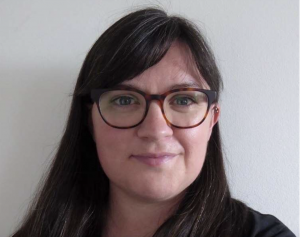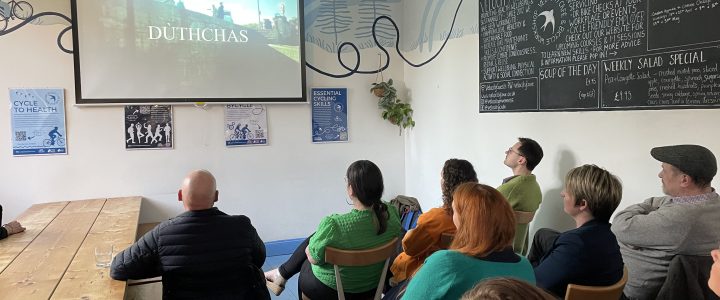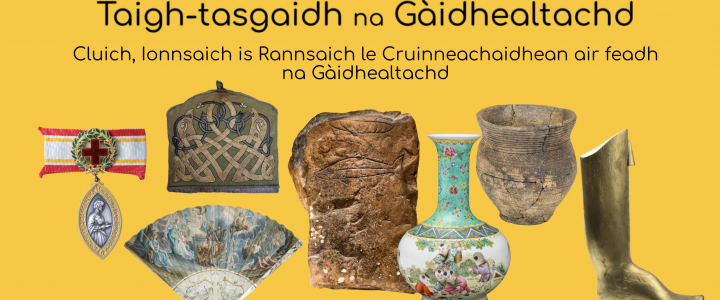With the current provision of Gaelic Development Officers (GDOs) across the region under threat, we have invited Anna MacQuarrie (Gaelic Museum Development Officer, working for Applecross Historical Society, Gairloch Museum, Highland Museum of Childhood and West Highland Museum) to highlight the important work our GDOs do and how the loss of this role will impact Gaelic development across the Highland region, most especially in our museums.
Museums demonstrate brilliantly the transformational impact that one well-placed funded role can make to a community. Across Scotland there have been around 30 such posts employed as Gaelic Development Officers (GDOs) since 2021, working to increase the number of people speaking, using and engaging with Gaelic. I am one of these GDOs. So it was devasting to learn this February that the scheme will end with no future funding put towards it. It had been funded partly by core Bòrd na Gàidhlig budget, with c£350,000 additional top-up funds from the Scottish Government. A trifling amount of money in the context of Government budgets, but hugely significant in a community context.

Working across sectors covering heritage, community development, the arts, youth engagement and the environment, these roles have seen transformational change in their organisations and communities, a majority of which are in the Highlands and Islands. There has been a distinct sense of hope and optimism associated with these roles, with meaningful and appropriately paid work opportunities for professionals often in rural areas. That the roles have been Gaelic-specific has been a necessary and very welcome step – putting the language and culture at the heart of all the activity happening, whether that is organising local music sessions, biodversity workshops, art exhibitions, or football camps for hundreds of young people across the country. Sometimes this work has been in areas where Gaelic remains a community language, in other areas it hasallowed people to re-engage, or engage for the first time, with it. It has been an unmitigated success, with Gaelic strengthened in response to community needs. One such example is with my own colleagues at West Highland Museum where, with Comunn na Gàidhlig, a national youth development group, we have delivered badly-needed extra-curricular sessions for Gaelic-speaking young people. This has contributed to them developing a sense of pride and ownership in and of their culture and the museum collections, and has given them vital social opportunities outwith a school setting.
My role has been a particularly rare beast among the wider GDO network, with museums outside the Hebrides generally slow to put Gaelic-specific work at the core of their developmental aims. These cuts will affect not just my work, but also GDOs in vital Highland cultural organisations like Fèisean nan Gàidheal, Fèis Rois, Eden Court, the Shieling Project, An Comunn Gàidhealach and SEALL. There are many more working in other areas which also impact the Highlands – the strength of the Gaelic community is the well-connected ecosystem in which we live and operate. But all of this is is now at risk.
As Gaels we have a distinctive worldview and, traditionally, customs and perspectives very different to that of the English-speaking world. The landscapes we love and Highland traditions we enjoy have been shaped by practices rooted in Gaelic culture. As has been well documented, a few hundred years of systematic oppression instilled a deep internalised shame in some generations that still lives on in some speakers to this day. However, Gaelic still remains – and is the backbone – to the culture of the areas in which our museums are located. It’s a language of poetry, song, landscape, nature and a culture of vibrant creative expression, holding a deep connection to who and what came before.
At the MHH Sealladh conference in 2023 I gave a brief introduction to my job and asked of the audience “If you’re not including Gaelic in your work then I’d ask you to reflect on why, and what you might be able to do?” It led to a huge amount of interest from attending heritage organisations, asking how they could begin to undertake similar work. While I’ve seen positive early steps, it needs people on the ground to deliver the work.
What else can Gaelic offer Highland museums? So many of the museums across the region are built upon a history lived by Gaelic speakers, whether or not it is explicitly recognised as such. Many Gaelic-language collections lie in stores without the expertise to interpret them – not a fault of any particular museum but sympomatic of our sector, which is already under-resourced. Gaelic offers the chance to engage with questions of decolonisation and climate breakdown from a distinct perspective, something which is increasingly being asked of us all as museum professionals. The work being done by GDOsnot only meets the needs of individual communities, but also responds tomuseum sectoral priorities. Aims of the National Gaelic Language Plan and recommendations of the Government-initiated Short-Life Working Group on Economic and Social Opportunities for Gaelic are also being met. Impact, impact, impact.
The proposed cuts are demoralising at best and, at worst, put all that we cherish about the Highlands’ indigenous language and culture at risk. Meanwhile, for as long as any of us have these GDO jobs, we’ll continue to shout about the value of the work we do, as well as our language, culture and how badly the museum sector needs more, not less of these opportunities. I hope you will too. Suas leis a’ Ghaidlig!


